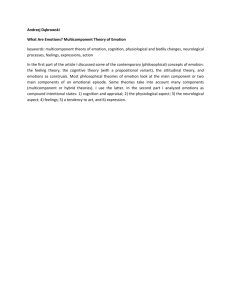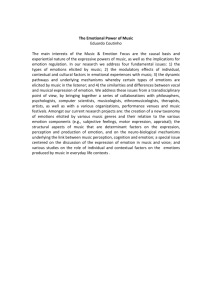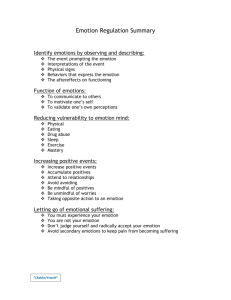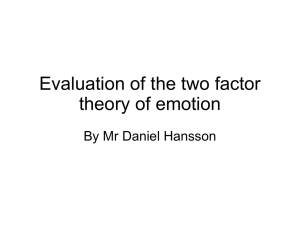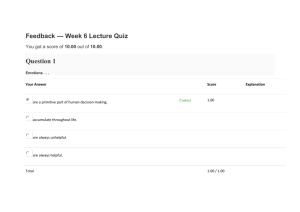88-120 Emotion and Cognition Group
advertisement
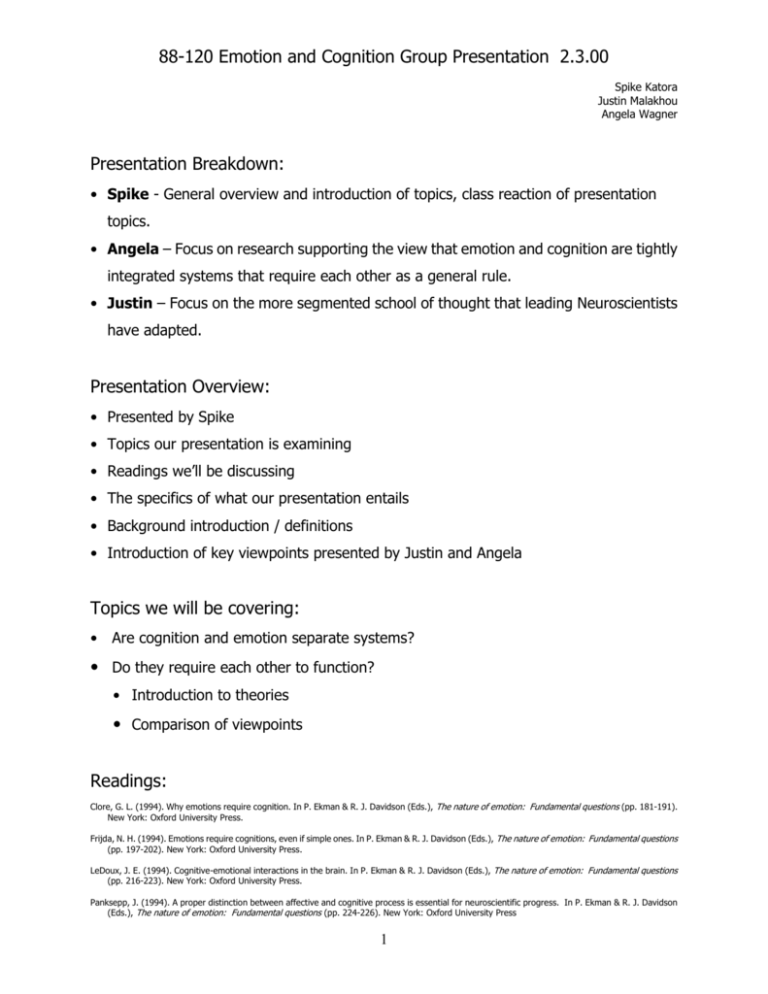
88-120 Emotion and Cognition Group Presentation 2.3.00 Spike Katora Justin Malakhou Angela Wagner Presentation Breakdown: • Spike - General overview and introduction of topics, class reaction of presentation topics. • Angela – Focus on research supporting the view that emotion and cognition are tightly integrated systems that require each other as a general rule. • Justin – Focus on the more segmented school of thought that leading Neuroscientists have adapted. Presentation Overview: • Presented by Spike • Topics our presentation is examining • Readings we’ll be discussing • The specifics of what our presentation entails • Background introduction / definitions • Introduction of key viewpoints presented by Justin and Angela Topics we will be covering: • Are cognition and emotion separate systems? • Do they require each other to function? • Introduction to theories • Comparison of viewpoints Readings: Clore, G. L. (1994). Why emotions require cognition. In P. Ekman & R. J. Davidson (Eds.), The nature of emotion: Fundamental questions (pp. 181-191). New York: Oxford University Press. Frijda, N. H. (1994). Emotions require cognitions, even if simple ones. In P. Ekman & R. J. Davidson (Eds.), The nature of emotion: Fundamental questions (pp. 197-202). New York: Oxford University Press. LeDoux, J. E. (1994). Cognitive-emotional interactions in the brain. In P. Ekman & R. J. Davidson (Eds.), The nature of emotion: Fundamental questions (pp. 216-223). New York: Oxford University Press. Panksepp, J. (1994). A proper distinction between affective and cognitive process is essential for neuroscientific progress. In P. Ekman & R. J. Davidson (Eds.), The nature of emotion: Fundamental questions (pp. 224-226). New York: Oxford University Press 1 What our presentation will cover: • Summary of the main arguments of the articles • Overview of the theoretical debates presented • Description of how the phenomenon described might apply to real-world settings • Critique of the reading • How the material relates to lecture or larger course themes A few quick definitions: (courtesy of www.dictionary.com) • emotion 1. An intense mental state that arises subjectively rather than through conscious effort and is often accompanied by physiological changes; a strong feeling: the emotions of joy, sorrow, reverence, hate, and love. 2. A state of mental agitation or disturbance: spoke unsteadily in a voice that betrayed his emotion. See Synonyms at feeling. 3. The part of the consciousness that involves feeling; sensibility: “The very essence of literature is the war between emotion and intellect” (Isaac Bashevis Singer). • cognition To know. Integration of Emotion and Cognition • Viewpoints, research, overview… • Presented by Angela Definition of cognition • • Cognition is conscious awareness • Cognition is complex information processing Definition of emotion • • Emotion involves focusing on an event and making an appraisal of that event • Emotion is different from affect and mood primarily because of this appraisal process 2 Interaction of cognition and emotion • The critical point in the interaction between emotion and cognition is the appraisal • process. The appraisal process is a cognitive, and since emotion requires the appraisal process by definition, emotion requires cognition Clore presents an example of the appraisal process based on the focal point of the • event and the valence of that focal point Segmentation of Emotion and Cognition • Viewpoints, research, overview… • Presented by Justin • "Separate systems" definition of cognition (Ledoux) emphasizes cognition as a category rather than an individual system • • Cognitive system includes sensory processing, perception, memory, etc... "Separate systems" definition of emotion (Ledoux) emphasizes its components rather than the system itself • Specific emotions include: fear, anger, pleasure, etc... Cognition and emotion are separate systems but coexist in such a way that one • complements the other • Panksepp argues that emotions require no cognitive inputs • His studies were performed exclusively on lab rats • Decorticated them within the first week of birth • The decorticated rats displayed primarily "species-typical“ emotive energy (thus they acted on a very basic emotional level, void of any high order emotive processing abilities.) • Proves that cognitive inputs are more strongly associated with lower level emotions 3 Ledoux also believes cognition and emotion to exist as separate systems • • Although the two "systems" perform different functions, emotional processing requires cognitive input for stimulus transmission • Cognition and emotion operate in parallel with each other • High order, or voluntary emotions, help the individual cope with involuntary emotions Class reaction to content presented: • General questions… • Questions specific to Integration subject matter… • Questions specific to Segmentation subject matter… • Closing… 4
